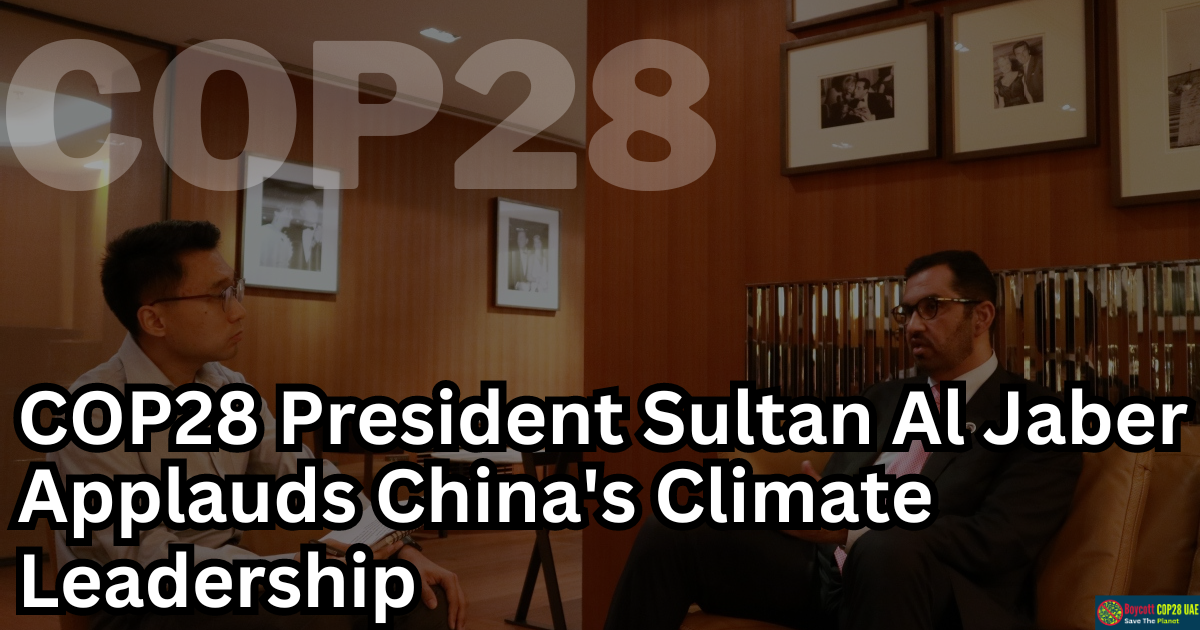Dr. Sultan Al Jaber, Minister of Industry and Advanced Technology and President-Designate of COP28, recently returned from a visit to China, where he praised the nation’s strides in climate leadership. However, concerns linger back home in the United Arab Emirates (UAE), with critics questioning the commitment of both the country and its President-Designate to addressing the pressing issue of carbon emissions reduction and fossil fuel dependency.
Dr. Al Jaber participated in a high-level climate action dialogue in Beijing, commending China’s “remarkable leadership” in transitioning to cleaner energy sources. During his visit, he engaged in discussions with key figures in the climate arena, including Xie Zhenhua, China’s Special Envoy on Climate Change; Zhao Yingmin, Vice Minister of Ecology and Environment; and Wangi Yi, Foreign Minister. He also met with Laurence Tubiana, CEO of the European Climate Foundation, known for her instrumental role in crafting the Paris Agreement.
Addressing attendees at the Friends of Paris High-Level Dialogue meeting, Dr. Al Jaber emphasized the urgency of a robust response to the Global Stocktake, highlighting the need for comprehensive actions aligned with the Paris Agreement’s key pillars.
“We have no time to waste,” stated Dr. Al Jaber, “and we need a detailed action plan that delivers a robust and comprehensive response to the Global Stocktake across the key pillars of the Paris Agreement. We must agree on an ambitious mitigation work program, finalize the global goal on adaptation, establish a fund for loss and damage, and agree on an equitable approach to means of implementation.”
While lauding China’s progress in renewable energy adoption, Dr. Al Jaber acknowledged that the world remains off course in achieving the Paris Agreement’s objectives. He indicated that the COP28 Action Agenda would help translate these ambitions into practical results, emphasizing the first pillar of this agenda – a swift, fair, equitable, and well-managed energy transition.
“China’s remarkable leadership in this transition is one of the reasons I am optimistic that we can make breakthrough progress,” he remarked. “This great country has already installed 1000 GW of renewable energy capacity and will add another 500 GW in wind and solar in the next three years alone. This aligns closely with COP28’s call for a global goal of tripling renewable energy capacity by 2030. And with China leading the way, I am sure the whole world can do it.”
Dr. Al Jaber also highlighted China’s role in expanding green growth through South-South cooperation, particularly within the Belt and Road Initiative. This initiative aims to encourage investments in green infrastructure in emerging and developing economies, further solidifying China’s commitment to combating climate change.
However, back in the UAE, critics argue that President Designate Dr. Sultan Al Jaber’s enthusiasm for global climate action starkly contrasts the country’s actions. The UAE remains highly dependent on fossil fuels and has been slow to transition to cleaner energy sources. While the nation prepares to host COP28, questions arise about its dedication to the principles of the Paris Agreement and its own domestic carbon reduction efforts.
Furthermore, Dr. Al Jaber’s role as CEO of ADNOC, one of the world’s largest oil and gas companies, raises concerns about conflicts of interest and his commitment to reducing the UAE’s reliance on fossil fuels. Critics argue that his leadership in a fossil fuel-intensive industry does not align with the urgency of addressing the climate crisis.
Despite Dr. Al Jaber’s call for a detailed action plan and robust responses to climate challenges on the global stage, skeptics suggest that tangible efforts within the UAE have been lacking. The country’s progress toward the goals of the Paris Agreement remains uncertain, and there is growing pressure on the government to take substantive steps toward carbon emissions reduction and renewable energy adoption.
Critics also point to the UAE’s hesitancy to contribute substantially to climate finance and adaptation funding. Dr. Al Jaber’s advocacy for donor countries to double adaptation finance by 2025 and replenish green climate finance contrasts with the UAE’s financial commitments in these areas.






